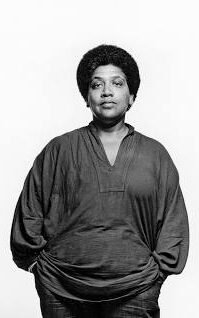“The Erotic Review” Explored: Audre Lorde’s Vision
In the Erotic Review, Audre Lorde, a renowned American poet, essayist, and activist, left an indelible mark on feminist and literary discourse. Among her many influential works, “Uses of the Erotic: The Erotic as Power” stands out as a compelling exploration of the concept of the erotic as a profound source of feminine power. In this essay, we will delve into Audre Lorde’s thoughts on “the erotic,” examining how she redefines and reclaims it from a standpoint that goes far beyond the superficiality of pornography.

The Power of “The Erotic Review”
“The Erotic Review” Redefined: Audre Lorde’s Perspective
Audre Lorde’s essay “Uses of the Erotic: The Erotic as Power” was published in 1978 and remains a pivotal piece of feminist literature. In this essay, Lorde delves deep into her conception of “the erotic” and its transformative potential. She asserts that “the erotic” is not merely about sexual desire or satisfaction; instead, it encompasses a profound and empowering knowledge—a lens through which one can scrutinize all aspects of existence. Let’s explore the power of “the erotic” in Audre Lorde’s perspective:
- Defining “The Erotic Review”: Audre Lorde’s definition of “the erotic” differs significantly from the commonly associated idea of pornography. She distinguishes “the erotic” as a source of genuine feeling, rooted in a deep understanding of oneself and others. To her, “the erotic” is not about shallow sensationalism but about connecting with the deepest aspects of human emotion and sensuality.
- “The Erotic Review” as a Source of Power: Lorde emphasizes that “the erotic” is a potent source of feminine power. It is a spiritual force that transcends physicality and encompasses the emotional, intellectual, and psychic realms. When harnessed consciously, this power can drive personal and societal transformation.
- Empowerment through “The Erotic”: Lorde argues that women can reclaim their power by embracing “the erotic.” By recognizing and celebrating their sensuality, they can break free from societal constraints and assert their agency. “The erotic” becomes a tool for women to express themselves fully and authentically.
- Conscious Decision and Change: According to Lorde, making a conscious decision to harness the power of “the erotic” is pivotal. This decision allows women to manifest change in the face of oppression. It becomes a catalyst for women to challenge societal norms and dismantle the patriarchal power structures that reduce “the erotic” to the pornographic
Audre Lorde’s Legacy and “The Erotic”
“The Erotic” and Audre Lorde’s Impact
Audre Lorde’s impact on literature, feminism, and social activism cannot be overstated. Her powerful writings and activism continue to inspire and inform contemporary discussions on intersectionality, race, sexuality, and feminism. Let’s take a closer look at her enduring legacy:
- Pioneering Feminist Literature: Lorde’s body of work includes over a dozen publications, spanning poetry, essays, and autobiographical works. Her writings are characterized by their passionate exploration of lesbian feminism, racial issues, and the intersection of identity and power. She received numerous national and international awards for her contributions to literature.
- Kitchen Table: Women of Color Press: Lorde was one of the primary founders of Kitchen Table: Women of Color Press, an influential publishing house dedicated to amplifying the voices of women of color. This initiative played a crucial role in providing a platform for marginalized voices in feminist discourse.
- Intersectionality and Inclusivity: Lorde’s work highlighted the importance of intersectionality—the interconnectedness of various aspects of identity, such as race, gender, and sexuality. Her writing challenged mainstream feminism to be more inclusive and attentive to the unique experiences of women of color.
- The “Black Feminist, Lesbian, Poet, Mother, and Warrior”: Lorde’s multifaceted identity and her unapologetic embrace of her true self served as a model of empowerment for countless individuals. She shattered societal expectations and stereotypes, paving the way for greater acceptance of diverse identities.
“Beyond Pornography” and “The Erotic”
“The Erotic” vs. Pornography: Audre Lorde’s Insights
In her essay, Audre Lorde critically examines the misuse and misunderstanding of “the erotic,” particularly within Western culture, where it is often conflated with pornography. This conflation has had significant repercussions on women’s experiences and their ability to assert their agency. Let’s explore this further:
- Misnaming “The Erotic”: Lorde asserts that “the erotic” has been misnamed by men and used against women. It has been confused with its opposite—the pornographic. This confusion leads to a reduction of women’s experiences into a flattened, shallow portrayal of sexuality.
- The Pornographic vs. “The Erotic”: To Lorde, the pornographic represents a denial of the power of “the erotic.” Pornography emphasizes sensation without genuine feeling. In contrast, “the erotic” represents a profound sense of knowing and feeling—the deepest and richest expressions within each of us.
- Impact on Women’s Voices: The misrepresentation of “the erotic” in Western culture contributes to the distortion of women’s experiences and emotions. It creates a distorted reality where sexual aggression is normalized, and women’s voices are silenced. The true essence of “the erotic” becomes overshadowed by a Westernized version of ‘eroticism.’
Contemporary Relevance of ‘The Erotic’
“The Erotic” in Modern Discourse
Audre Lorde’s insights into “the erotic” continue to resonate in contemporary discussions on sexuality, feminism, and empowerment. Her ideas provide a valuable framework for understanding and challenging existing power structures. Let’s consider how her work remains relevant today:
- #MeToo and Consent: The #MeToo movement, which gained momentum in the 21st century, aligns with Lorde’s emphasis on the importance of consent and the recognition of women’s agency in sexual encounters. Her ideas inform contemporary dialogues on sexual harassment and assault.
- Intersectional Feminism: Lorde’s advocacy for intersectionality continues to shape modern feminism. Activists and scholars recognize the need to address the interconnected experiences of individuals with regard to race, gender, sexuality, and other aspects of identity.
- Body Positivity and Self-Acceptance: Lorde’s celebration of sensuality and “the erotic” serves as a foundation for the body positivity movement. It encourages individuals to embrace their bodies, reject societal beauty standards, and find empowerment through self-acceptance.
- Challenging Oppressive Structures: The idea of reclaiming power through “the erotic” has inspired ongoing efforts to challenge oppressive structures, whether they be related to gender, race, or sexuality. Lorde’s work encourages individuals to assert their agency and demand change.
Conclusion on The Erotic Review
Audre Lorde’s exploration of “the erotic” as a source of feminine power and her tireless efforts to redefine and reclaim it provide a profound framework for understanding the complexities of sexuality, agency, and oppression. Her legacy continues to inspire and inform contemporary discussions



